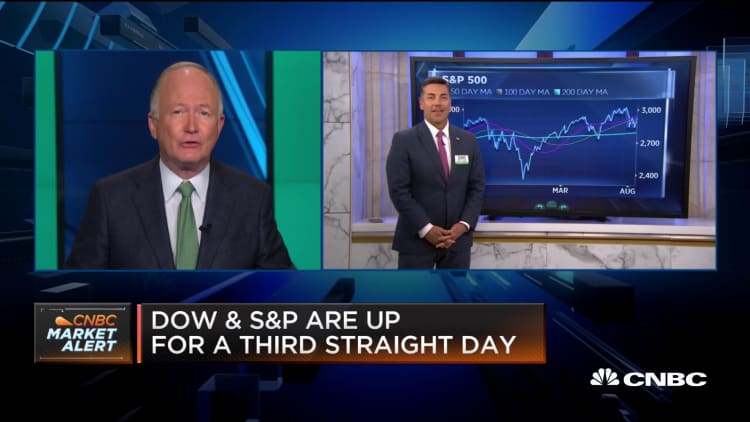
Stocks rose sharply on Monday as Treasury yields rebounded, quelling fears of a possible recession. Equities also got a boost after the U.S. agreed to extend a temporary reprieve to Chinese telecom giant Huawei.
The Dow Jones Industrial Average closed 249.78 points higher, or 1%, at 26,135.79. The S&P 500 gained 1.2% to close at 2,923.65 as the energy and tech sectors outperformed. The Nasdaq Composite advanced 1.4% to end the day at 8,002.81.
These gains add to a rebound that started last week after the Dow posted its worst session of 2019. The 30-stock index plummeted 800 points, or 3.1% on Wednesday before regaining some of the lost ground on Thursday and Friday. The S&P 500 is still down 1.9% in August and off more than 3% from a recent record.
The benchmark 10-year Treasury yields rose to about 1.6% from around 1.54%. Bank shares rose along with yields. Bank of America closed 0.9% higher along with J.P. Morgan Chase. Citigroup climbed 1.3%.
"We're seeing more stabilization, and it's really off the back of more stimulus in the air," said Gregory Faranello, head of U.S. rates at AmeriVet Securities. "We're just taking a little bit of a break but I'm not entirely convinced that the move lower on rates is over."
The People's Bank of China unveiled an interest-rate reform over the weekend aimed at lowering borrowing costs for Chinese companies. In Germany, the government is reportedly preparing fiscal stimulus measures in case the country's economy falls into a recession. Economic growth in China and Germany has slowed down this year amid tighter trade conditions, leading investors to rush into safe havens like the 10-year Treasury note.
Last week, the 10-year yield fell to its lowest level in more than three years and briefly traded below its 2-year counterpart. This is referred to as a yield-curve inversion and is seen by traders as a potential signal that a recession may be on the horizon.
Ed Yardeni, president and chief investment strategist at Yardeni Research, thinks it might be premature to call for a recession now.
"An inverted yield curve has predicted 10 of the last 7 recessions. In other words, it isn't as accurate a predictor of economic downturns as widely believed," Yardeni wrote in a note to clients. "It can be misleading, having given three false signals of a recession."
President Donald Trump said Sunday he doesn't see a recession on the horizon in the U.S. after a volatile week for markets.
"I don't think we're having a recession," Trump told reporters. "We're doing tremendously well. Our consumers are rich. I gave a tremendous tax cut and they're loaded up with money."
Fears of a recession come as the U.S. and China engage each other in a trade war. Over the past year, the two countries have slapped tariffs on billions of dollars worth of their goods. The U.S. has also targeted Huawei in the trade war, making it more difficult for U.S. companies to do business with the Chinese telecom.
"I'm not convinced that we're going to get out of this mess unless we get a full-blown trade agreement, which I don't think will happen this calendar year," said Randy Frederick, vice president of trading and derivatives at Charles Schwab. "Every few minutes something changes and that creates volatility."
"We're going to continue to have big up days and big down days. That's what volatility means," he said.
However, Commerce Secretary Wilbur Ross said the U.S. extended a license for 90 days that allows Huawei to continue business with the U.S. companies to service existing customers.
Shares of chipmakers rose on the news. On Semiconductor and AMD gained 2.7% and 1%, respectively. Micron Technology rose 3.4%. The VanEck Vectors Semiconductor ETF (SMH) advanced 1.7%.
Apple also advanced 1.9%. The move up comes after CEO Tim Cook spoke with Trump on Sunday. The U.S. president said Cook made a "good case" that it would be hard for Apple to pay tariffs, when Samsung does not face the same level of duties given its manufacturing in South Korea.
—CNBC's Silvia Amaro and Spencer Kimball contributed to this report.


